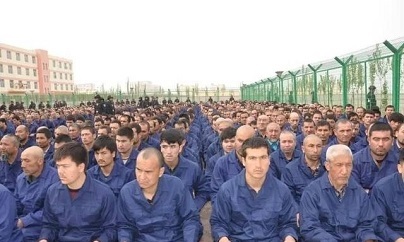China is allegedly pushing Tibetans into military-style labour camps similar to the ones in Xinjiang, according to a Reuters report.
British & NATO Jets Jamming The Radars Of Powerful S-400 Systems – Russian Experts
Beijing has made quotas for the mass transfer of rural labourers within Tibet and to other parts of China, according to over a hundred state media reports, policy documents from government bureaus in Tibet and procurement requests released between 2016-2020 and reviewed by Reuters.
The report is based on a study by Jamestown Foundation, a Washington, D.C.-based institute that focuses on policy issues of strategic importance to the US, using state media reports and other documents.
The report stated that the labour transfer policy mandates that pastoralists and farmers are to be subjected to centralized “military-style” vocational training, which aims to reform “backward thinking” and includes training in “work discipline,” law, and the Chinese language. Rights groups have criticised this and have said that such a move is aimed at ideological training and have coercive elements.
“This is now, in my opinion, the strongest, most clear and targeted attack on traditional Tibetan livelihoods that we have seen almost since the Cultural Revolution” of 1966 to 1976, said Adrian Zenz, an independent Tibet and Xinjiang researcher, who compiled the core findings of the program, quoted by Reuters. “It’s a coercive lifestyle change from nomadism and farming to wage labour.”
China gained control of Tibet in the 1950s when it annexed the Tibetan Autonomous Region. The region saw a massive uprising in 1959 but the Chinese troops crushed it.

Fearing for his life, the Dalai Lama fled to India and a Tibetan government in exile was set up in Dharamshala. Tibetans have been resisting the Chinese occupation for decades. The movement has now been rekindled after this bloody clash that killed one Tibetan soldier from belonging to India’s Special Frontier Force.
Xi Jinping’s such designs have received a global backlash. A United Nations report said that up to one million people from Xinjiang region, mostly consisting of a minority group – Muslim Uighurs, are being held in re-education camps.
Many human rights groups, including Amnesty International and Human Rights Watch, have accused Beijing of imprisoning ethnic minorities indefinitely with accusations of several human right violations.
In recent years, Xinjiang and Tibet have been the target of harsh policies in pursuit of what Chinese authorities call “stability maintenance.”, reported Reuters. It emphasised that such policies are aimed at quelling dissent, unrest or separatism and include restricting the travel of ethnic citizens to other parts of China and abroad, and tightening control over religious activities.
China’s Ministry of Foreign Affairs told Reuters that it denied the claims of forced labour camps. “What these people with ulterior motives are calling ‘forced labour’ simply does not exist. We hope the international community will distinguish right from wrong, respect facts, and not be fooled by lies,” it said.
The Jamestown Foundation report concluded that although Beijing’s approach in Tibet is “less coercive” than in Xinjiang, in a system where the transition between securitization and poverty alleviation is seamless, there is no telling where coercion stops and where genuinely voluntary local agency begins.




